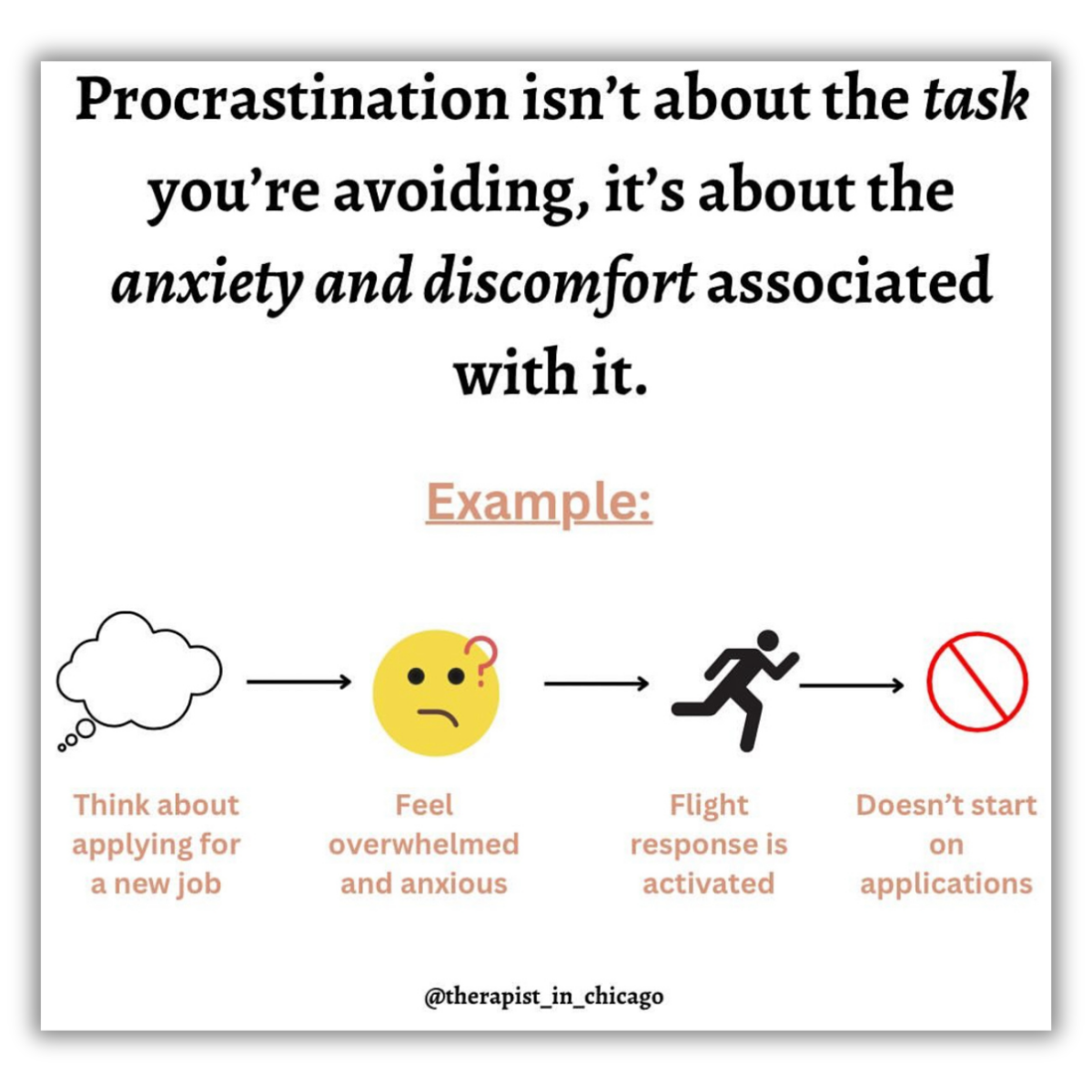How to Break Free from Procrastination
Mike is at work, scrolling on his phone instead of working on the new project he was just assigned by his boss. Every time he thinks about starting the project, he feels anxious and pushes it off. “I’ll just start it tonight when I get home,” he says to himself as he continues to scroll.
We have all been in Mike’s shoes in one way or another because procrastination is part of the human condition. We are hardwired to avoid things that we perceive as dangerous or uncomfortable in any way, so of course we are tempted to put off, avoid, or delay the tasks in our lives that do not make us feel good.
Even though we can have empathy for the evolutionary roots of procrastination, frequent procrastination can cause profound distress in our lives. Typically, when we procrastinate, we lose opportunities to connect with parts of our lives that matter to us or make us feel good in the long-run, such as managing our responsibilities at work, navigating financial problems, reaching out to people we care about, or starting a new exercise regimen, to name a few.
The good news is that there are evidence-based strategies you can practice to challenge procrastination so that you can spend less time avoiding and more time engaging.
Understand how procrastination works
When we think about a task that brings us discomfort or anxiety, our flight response is activated and we ultimately avoid completing the task.

How to challenge procrastination
Tip #1: Stop beating yourself up for the fact you aren’t doing the thing
Okay, so you aren’t doing the thing you want to be doing because you’re procrastinating. But that doesn’t mean you deserve to beat yourself up for it or let self-criticism win out. These moments of self-criticism can elicit shame and guilt, which not only can negatively impact your sense of self but also make it easy to continue the pattern of procrastination. Remember, at the center of procrastination is our relationship to uncomfortable feelings, so adding shame and guilt to the equation usually does not help move things along. Moreover, research continues to demonstrate that self-compassion, compared to self-criticism, is a better motivator for change (Neff, 2023).
Tip #2: Notice the discomfort & be willing to tolerate it
There are many ways you may experience discomfort at the thought of engaging in the task you are putting off. Maybe you are procrastinating looking into new career paths because it feels daunting and overwhelming. Or perhaps you are procrastinating putting your laundry away because it feels tedious or boring. You might be avoiding gathering your tax information because it feels frustrating and complicated. No matter what feelings arise for you, it is important to notice the discomfort and then be willing to tolerate it. Unfortunately, we cannot always wait for the uncomfortable feelings to go away, so a willingness to be emotionally uncomfortable is required if you are to break free from procrastination’s hold.
Tip #3: Identify “procrastination fibs” & don’t let them guide your choices
Almost always, our minds come up with fibs that convince us to continue indulging in procrastination. Some common “procrastination fibs” many of us can relate to include:
- “I’ll just do this later.”
- “I’ll do this when I have more time.”
- “I’ll start when I have everything I need.”
- “What’s the point in starting? I’m already late with this anyway.”
- “I’ll get to this when I feel ready.”
- “This is stupid and doesn’t even really matter.”
- “I can start when I feel like I understand everything fully.”
- “There are other things I should be doing anyway.”
Sound familiar? If so, you know that getting hooked by these types of fibs keeps you stuck in the pattern of procrastination. This is your mind’s way of trying to protect you from feeling uncomfortable and from experiencing situations that cause distress. When your mind sends you thoughts like these, try to notice them without allowing them to alter your behavior. For example, if you think about putting the laundry away and your mind sends you a fib such as “I’ll just get to this later,” notice it and let it float by in your mind’s eye. Do not take it at face value and start walking toward your laundry basket anyway.
Tip #4: Take action with any of these strategies
Now, it’s time to take action. Take a look at the list of strategies below and see which one(s) you may want to try:
- Break the task into smaller steps and take them one at a time.
- Set a timer for a manageable amount of time (ex: 5 minutes) and commit to the allotted time frame. Remember, some progress is better than none.
- Visualize yourself getting the task done and how you will feel afterward.
- Set up a reward system (ex: if I work for 30 minutes, I will let myself take a 5-minute reading break).
- Be mindful of your environment and try to eliminate distractions as much as possible.
- Actively remind yourself you are capable of tolerating discomfort.
- Loop in a supportive person who can help motivate and support you.
When you find strategies that work for you, be proud and store these away for future situations! It isn’t easy to change habits or experience discomfort. Make sure to celebrate your procrastination wins-no matter how “big” or “small.”
Tip #5: Ground yourself throughout the process
As you work through the task, it is likely that there may be some bumps in the road. Your mind might start coming up with procrastination fibs again or try to convince you to stop what you’re doing. The feelings you were avoiding in the first place might start to creep up. For example, if you are working on your taxes, you might get to a spot in the process where you feel stuck. Maybe you don’t have the answer or know how to respond. You might start to feel frustrated and confused, then worried at the fear of doing them incorrectly. The urge to flee may feel strong. If this happens, try to ground yourself by remembering your “why,” taking deep breaths, allowing yourself a brief break, or engaging in a short meditation. Grounding yourself throughout the process will help you stay engaged so that you can continue to make steady progress.
Closing thoughts
Even though procrastination can feel as though it has a hold on us, we can take comfort in knowing that we are actually the ones with the power. We become the driver, not the passenger, when we understand how procrastination works, when we are willing to feel uncomfortable, and when we allow ourselves the opportunity to take action.
Neff, K. D. (2023). Self-Compassion: Theory, Method, Research, and Intervention. Annual Review of Psychology, 74:193-217.

